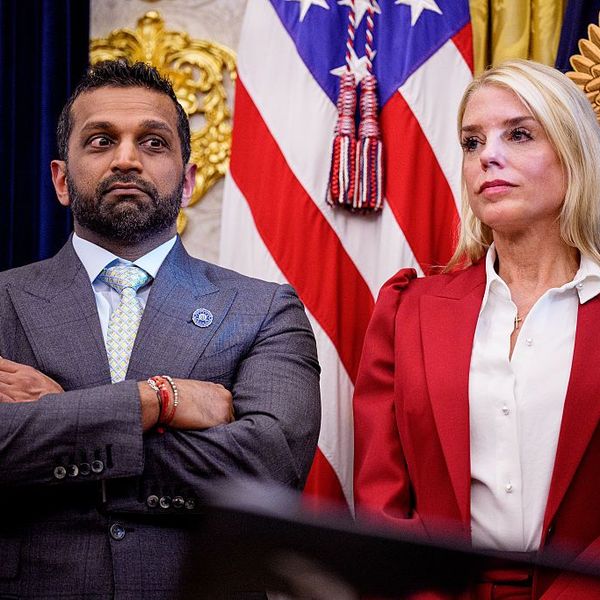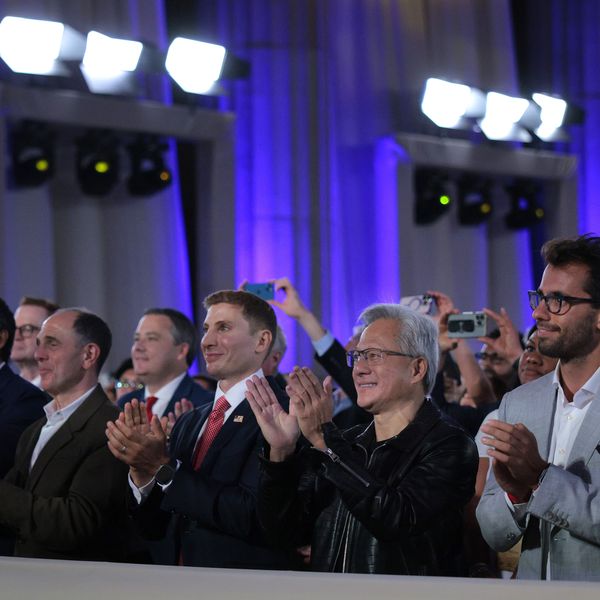Bannon Heralds "Deconstruction of Administrative State" and Trump's "New Political Order"
Speaking at CPAC on Thursday, chief strategist again called media 'opposition party' and said Trump administration would deconstruct 'administrative state'
Giving rare public remarks on Thursday, White House chief strategist Steve Bannon said the Trump cabinet was working towards the "deconstruction of the administrative state" and repeatedly referred to the media as "the opposition party."
Bannon's speech at the 2017 Conservative Political Action Conference (CPAC) in National Harbor, Maryland evoked the same shades of authoritarianism that have permeated President Donald Trump's time in office, from his outraged tweets to his picks to lead federal agencies.
He outlined what he described as "three verticals" of Trump's agenda that would focus on "national security and sovereignty," "economic nationalism," and "deconstruction of the administrative state"--meaning a rollback of taxes, regulations, and trade agreements that the administration has claimed are hampering economic growth and individualism.
"If you look at these cabinet nominees, they were selected for a reason, and that is deconstruction," he said.
Bannon appeared on stage at the Gaylord National Resort and Convention Center with White House chief of staff Reince Priebus, where the two of them were interviewed by Matt Schlapp, president of the American Conservative Union, which hosts the annual CPAC gathering.
At one point, Bannon, who formerly chaired the rightwing outlet Breitbart News, called the media "the opposition party," echoing remarks both he and Trump have previously made.
"They're corporatist, globalist media that are adamantly opposed to an economic nationalist agenda like Donald Trump has," he said. "If you look at the opposition party and how they portrayed the campaign and how they portrayed the transition and how they portray the administration, it's always wrong."
"They're going to continue to fight," he said of the media. "If you think they are giving you your country back without a fight, you are sadly mistaken."
At several points throughout their speech, Bannon and Priebus were interrupted by loud cheers from the audience.
"There's a new political order that's being formed," Bannon said toward the end. "The center core of what we believe, that we're a nation with an economy...with a reason for being, I think that's what unites us."
An Urgent Message From Our Co-Founder
Dear Common Dreams reader, The U.S. is on a fast track to authoritarianism like nothing I've ever seen. Meanwhile, corporate news outlets are utterly capitulating to Trump, twisting their coverage to avoid drawing his ire while lining up to stuff cash in his pockets. That's why I believe that Common Dreams is doing the best and most consequential reporting that we've ever done. Our small but mighty team is a progressive reporting powerhouse, covering the news every day that the corporate media never will. Our mission has always been simple: To inform. To inspire. And to ignite change for the common good. Now here's the key piece that I want all our readers to understand: None of this would be possible without your financial support. That's not just some fundraising cliche. It's the absolute and literal truth. We don't accept corporate advertising and never will. We don't have a paywall because we don't think people should be blocked from critical news based on their ability to pay. Everything we do is funded by the donations of readers like you. Will you donate now to help power the nonprofit, independent reporting of Common Dreams? Thank you for being a vital member of our community. Together, we can keep independent journalism alive when it’s needed most. - Craig Brown, Co-founder |
Giving rare public remarks on Thursday, White House chief strategist Steve Bannon said the Trump cabinet was working towards the "deconstruction of the administrative state" and repeatedly referred to the media as "the opposition party."
Bannon's speech at the 2017 Conservative Political Action Conference (CPAC) in National Harbor, Maryland evoked the same shades of authoritarianism that have permeated President Donald Trump's time in office, from his outraged tweets to his picks to lead federal agencies.
He outlined what he described as "three verticals" of Trump's agenda that would focus on "national security and sovereignty," "economic nationalism," and "deconstruction of the administrative state"--meaning a rollback of taxes, regulations, and trade agreements that the administration has claimed are hampering economic growth and individualism.
"If you look at these cabinet nominees, they were selected for a reason, and that is deconstruction," he said.
Bannon appeared on stage at the Gaylord National Resort and Convention Center with White House chief of staff Reince Priebus, where the two of them were interviewed by Matt Schlapp, president of the American Conservative Union, which hosts the annual CPAC gathering.
At one point, Bannon, who formerly chaired the rightwing outlet Breitbart News, called the media "the opposition party," echoing remarks both he and Trump have previously made.
"They're corporatist, globalist media that are adamantly opposed to an economic nationalist agenda like Donald Trump has," he said. "If you look at the opposition party and how they portrayed the campaign and how they portrayed the transition and how they portray the administration, it's always wrong."
"They're going to continue to fight," he said of the media. "If you think they are giving you your country back without a fight, you are sadly mistaken."
At several points throughout their speech, Bannon and Priebus were interrupted by loud cheers from the audience.
"There's a new political order that's being formed," Bannon said toward the end. "The center core of what we believe, that we're a nation with an economy...with a reason for being, I think that's what unites us."
Giving rare public remarks on Thursday, White House chief strategist Steve Bannon said the Trump cabinet was working towards the "deconstruction of the administrative state" and repeatedly referred to the media as "the opposition party."
Bannon's speech at the 2017 Conservative Political Action Conference (CPAC) in National Harbor, Maryland evoked the same shades of authoritarianism that have permeated President Donald Trump's time in office, from his outraged tweets to his picks to lead federal agencies.
He outlined what he described as "three verticals" of Trump's agenda that would focus on "national security and sovereignty," "economic nationalism," and "deconstruction of the administrative state"--meaning a rollback of taxes, regulations, and trade agreements that the administration has claimed are hampering economic growth and individualism.
"If you look at these cabinet nominees, they were selected for a reason, and that is deconstruction," he said.
Bannon appeared on stage at the Gaylord National Resort and Convention Center with White House chief of staff Reince Priebus, where the two of them were interviewed by Matt Schlapp, president of the American Conservative Union, which hosts the annual CPAC gathering.
At one point, Bannon, who formerly chaired the rightwing outlet Breitbart News, called the media "the opposition party," echoing remarks both he and Trump have previously made.
"They're corporatist, globalist media that are adamantly opposed to an economic nationalist agenda like Donald Trump has," he said. "If you look at the opposition party and how they portrayed the campaign and how they portrayed the transition and how they portray the administration, it's always wrong."
"They're going to continue to fight," he said of the media. "If you think they are giving you your country back without a fight, you are sadly mistaken."
At several points throughout their speech, Bannon and Priebus were interrupted by loud cheers from the audience.
"There's a new political order that's being formed," Bannon said toward the end. "The center core of what we believe, that we're a nation with an economy...with a reason for being, I think that's what unites us."

